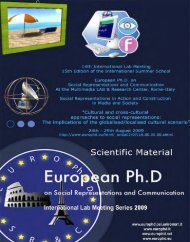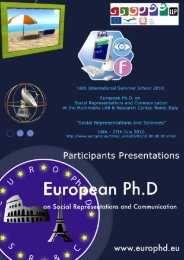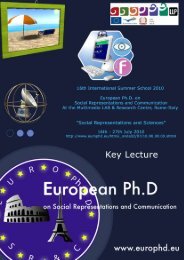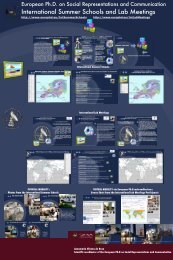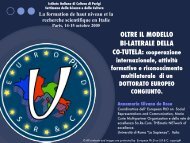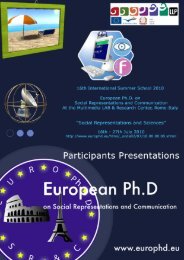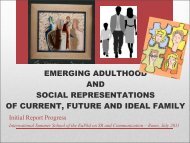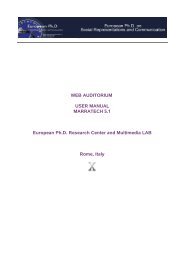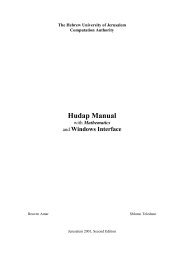The "boomerang" effect of the radicalism in discourse analysis
The "boomerang" effect of the radicalism in discourse analysis
The "boomerang" effect of the radicalism in discourse analysis
Create successful ePaper yourself
Turn your PDF publications into a flip-book with our unique Google optimized e-Paper software.
<strong>The</strong> auto-confutation <strong>of</strong> radical relativism.<br />
<strong>The</strong> most radical versions <strong>of</strong> <strong>the</strong> <strong>discourse</strong> <strong>analysis</strong> - which <strong>in</strong> virtue <strong>of</strong> <strong>the</strong> antiessentialistic<br />
and relativistic positions arise <strong>in</strong> contestualism and extreme cont<strong>in</strong>gentism -<br />
appear subject to a series <strong>of</strong> self-confutations.<br />
To tell <strong>the</strong> truth, <strong>the</strong> question is very much older. Already Plato had noted that <strong>the</strong><br />
sophistic relativism, occurr<strong>in</strong>g <strong>in</strong> a non relativisable situation, went so far as to autoconfute<br />
itself. Still <strong>in</strong> a philosophical environment, but <strong>in</strong> a horizon referr<strong>in</strong>g to <strong>the</strong> philosophy <strong>of</strong><br />
<strong>the</strong> n<strong>in</strong>eteenth century, Franca D'Agost<strong>in</strong>i (1999, p. 285) identifies a series <strong>of</strong><br />
"paradigmatic anomalies" <strong>in</strong> <strong>the</strong> context <strong>of</strong> a critical review <strong>of</strong> <strong>the</strong> radically relativistic and<br />
contestualistic philosophic <strong>the</strong>ories, which may be summed up as follows:<br />
(a) “by declar<strong>in</strong>g <strong>the</strong> absolute plurality <strong>of</strong> <strong>the</strong> truth, <strong>the</strong> unity <strong>of</strong> <strong>the</strong> specific assertion<br />
is presumed”;<br />
(b) “by affirm<strong>in</strong>g <strong>the</strong> universal contestuality <strong>of</strong> <strong>the</strong> mean<strong>in</strong>g, a sovracontestual <strong>the</strong>ory<br />
<strong>of</strong> <strong>the</strong> mean<strong>in</strong>g is formulated”;<br />
(c) “by <strong>the</strong>oris<strong>in</strong>g <strong>the</strong> relativity <strong>of</strong> <strong>the</strong> values and <strong>of</strong> <strong>the</strong> mean<strong>in</strong>gs, an <strong>in</strong>conditional<br />
and absolute truth is <strong>the</strong>orised”.<br />
In o<strong>the</strong>r terms, <strong>the</strong> key propositions <strong>of</strong> relativism and contestualism, be<strong>in</strong>g <strong>in</strong> <strong>the</strong>ir turn<br />
<strong>in</strong>capable <strong>of</strong> be<strong>in</strong>g relativised and contestualised, seem to be self-contradictory. By<br />
declar<strong>in</strong>g <strong>the</strong> absolute relativity <strong>of</strong> knowledge, <strong>the</strong> existence is, <strong>in</strong> fact, <strong>the</strong>orised <strong>of</strong> an<br />
unconditional and absolute truth, which denies <strong>the</strong> very idea <strong>of</strong> relativity.<br />
If, go<strong>in</strong>g from <strong>the</strong>se arguments, one reflects on <strong>the</strong> radical socio-constructivistic<br />
positions expressed <strong>in</strong> <strong>the</strong> <strong>discourse</strong> <strong>analysis</strong>, <strong>the</strong> same difficulties <strong>of</strong> logic seem to arise,<br />
that were treated as “paradoxes” (see Smith, 2001, p. 82-92). One <strong>of</strong> <strong>the</strong> most frequent<br />
criticisms addressed to <strong>the</strong> RDA is based on <strong>the</strong> adoption <strong>of</strong> <strong>the</strong> tu quoque (or you too)<br />
argument. By apply<strong>in</strong>g to <strong>the</strong> RDA its own <strong>discourse</strong> <strong>the</strong>ory, it is possible to affirm that <strong>the</strong><br />
absolute cont<strong>in</strong>genism and relativism that characterised <strong>the</strong> <strong>discourse</strong> may also characterise<br />
<strong>the</strong> <strong>the</strong>oretical production <strong>of</strong> <strong>the</strong> RDA and <strong>the</strong> results <strong>of</strong> its research (Ashmore, 1989; Burr,<br />
1995). By act<strong>in</strong>g <strong>in</strong> this viewpo<strong>in</strong>t, it may, <strong>in</strong> fact, be ma<strong>in</strong>ta<strong>in</strong>ed that any <strong>the</strong>ory that<br />
postulates <strong>the</strong> total relativity <strong>of</strong> knowledge is itself relative and contextual.<br />
“Relativism <strong>of</strong> <strong>discourse</strong> <strong>the</strong>ory makes it difficult to justify adopt<strong>in</strong>g one particular read<strong>in</strong>g <strong>of</strong><br />
an event or text ra<strong>the</strong>r than o<strong>the</strong>rs. This is a problem that occurs because <strong>of</strong> <strong>the</strong> <strong>the</strong>ory’s own<br />
reflexivity, that is, <strong>the</strong> way that <strong>the</strong> <strong>the</strong>ory is applied to itself and its own research practice<br />
(<strong>discourse</strong> <strong>analysis</strong>). A <strong>discourse</strong> <strong>analysis</strong> cannot be taken to reveal a 'truth' ly<strong>in</strong>g with<strong>in</strong> <strong>the</strong> text,<br />
and must acknowledge its own research f<strong>in</strong>d<strong>in</strong>gs as open to o<strong>the</strong>r, potentially valid, read<strong>in</strong>gs.”<br />
(Burr, 1995, p. 180)<br />
However, this criticism does not seem to form a problem for <strong>the</strong> RDA. On <strong>the</strong> contrary<br />
it is <strong>in</strong> certa<strong>in</strong> respects shared by its supporters, tak<strong>in</strong>g <strong>the</strong> form <strong>of</strong> a cautious methodology<br />
<strong>in</strong> <strong>the</strong> practise <strong>of</strong> research dom<strong>in</strong>ated reflexivity, observed <strong>in</strong> <strong>the</strong> sphere <strong>of</strong> <strong>the</strong> sociology <strong>of</strong><br />
knowledge. In fact, by assert<strong>in</strong>g that each <strong>discourse</strong> is a contestualised social practice<br />
directed towards <strong>the</strong> atta<strong>in</strong>ment <strong>of</strong> aims, <strong>the</strong> RDA recognises <strong>the</strong> partially subjective and<br />
action-oriented character <strong>of</strong> it own works.<br />
13




